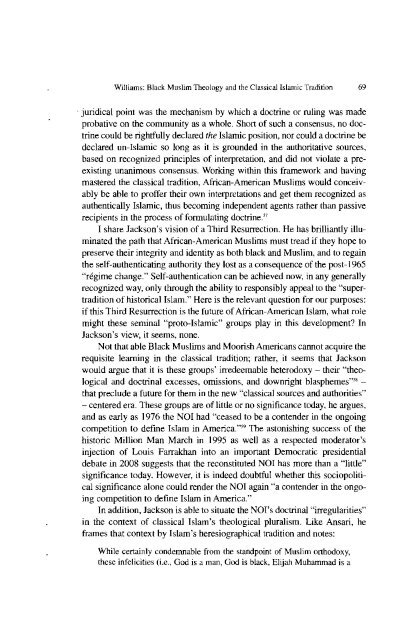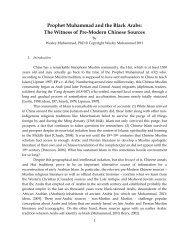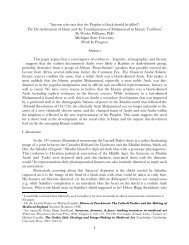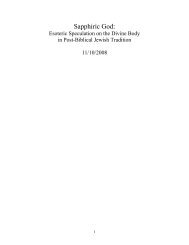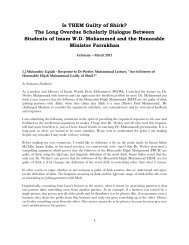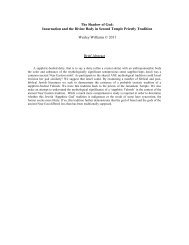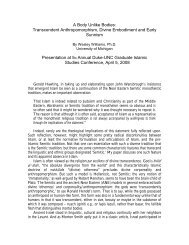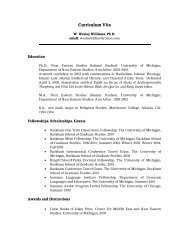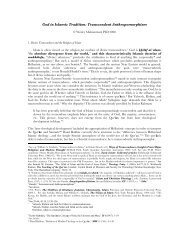Black Muslim Theology and the Classical Islamic Tradition ...
Black Muslim Theology and the Classical Islamic Tradition ...
Black Muslim Theology and the Classical Islamic Tradition ...
You also want an ePaper? Increase the reach of your titles
YUMPU automatically turns print PDFs into web optimized ePapers that Google loves.
Williams: <strong>Black</strong> <strong>Muslim</strong> <strong>Theology</strong> <strong>and</strong> <strong>the</strong> <strong>Classical</strong> <strong>Islamic</strong> <strong>Tradition</strong> 69<br />
. juridical point was <strong>the</strong> mechanism by which a doctrine or ruling was made<br />
probative on <strong>the</strong> community as a whole. Shorr of such a consensus, no doctrine<br />
could be rightfully declared tire <strong>Islamic</strong> position, nor could a doctrine be<br />
declared un-<strong>Islamic</strong> so long as it is gronnded in <strong>the</strong> authoritative sources,<br />
based on recognized principles of interpretation, <strong>and</strong> did not violate a preexisting<br />
unanimous consensus. Working within this framework <strong>and</strong> having<br />
mastered <strong>the</strong> classical tradition, Afiican-American <strong>Muslim</strong>s would conceivably<br />
be able to proffer <strong>the</strong>ir own interpretations <strong>and</strong> get <strong>the</strong>m recognized as<br />
au<strong>the</strong>ntically <strong>Islamic</strong>, thus becoming independent agents ra<strong>the</strong>r than passive<br />
recipients in <strong>the</strong> process offorlllulating doctrine."<br />
I share Jackson's vision of a 1bird Resurrection. He has brilliantly illuminated<br />
<strong>the</strong> path that African-American <strong>Muslim</strong>s must tread if <strong>the</strong>y hope to<br />
preserve <strong>the</strong>ir integrity <strong>and</strong> identity as both black <strong>and</strong> <strong>Muslim</strong>, <strong>and</strong> to regain<br />
<strong>the</strong> self-au<strong>the</strong>nticating authority <strong>the</strong>y lost as a consequence of <strong>the</strong> post-l 965<br />
"regime change," Self-au<strong>the</strong>ntication can be achieved now, in any generally<br />
recognized way, only through <strong>the</strong> ability to responsibly appeal to <strong>the</strong> "supertradition<br />
of historical Islam." Here is <strong>the</strong> relevant question for our purposes:<br />
ifthis Third Resurrection is <strong>the</strong> future ofAfrican-American Islam, what role<br />
might <strong>the</strong>se seminal "proto-<strong>Islamic</strong>" groups play in this development? In<br />
Jackson's view, it seems, none.<br />
Not that able <strong>Black</strong> <strong>Muslim</strong>s <strong>and</strong> Moorish Americans cannot acquire <strong>the</strong><br />
requisite learning in <strong>the</strong> classical tradition; ra<strong>the</strong>r, it seems that Jackson<br />
would argue that it is <strong>the</strong>se groups' irredeemable heterodoxy - <strong>the</strong>ir "<strong>the</strong>ological<br />
<strong>and</strong> doctrinal excesses, omissions, <strong>and</strong> downright blasphemes"" <br />
that preclude a future for <strong>the</strong>m in <strong>the</strong> new "classical sources <strong>and</strong> authorities"<br />
- centered era, These groups are of little or no significance today, he argues,<br />
<strong>and</strong> as early as 1976 <strong>the</strong> NO! had "ceased to be a contender in <strong>the</strong> ongoing<br />
competition to defme Islam in America,"'" The astonishing success of <strong>the</strong><br />
historic Million Man March in 1995 as well as a respected moderator's<br />
injection of Louis Farrakhan into an imPOltant Democratic presidential<br />
debate in 2008 suggests that <strong>the</strong> reconstituted NO! has more than a "little"<br />
significance today, However, it is indeed douhtful whe<strong>the</strong>r this sociopolitical<br />
significance alone could render <strong>the</strong> NOI again "a contender in <strong>the</strong> ongoing<br />
competition to define Islam in America,"<br />
In addition, Jackson is able to situate <strong>the</strong> NO!'s doctrinal "irregularities"<br />
in <strong>the</strong> context of classical Islam's <strong>the</strong>ological pluralism. Like Ansari, he<br />
frames that context by Islam's heresiographical tmdition <strong>and</strong> notes:<br />
While certainly condemnable Irom <strong>the</strong> st<strong>and</strong>point of <strong>Muslim</strong> orthodoxy,<br />
<strong>the</strong>se infelicities (i.e., God is a man, God is black, Elijah Muhammad is a


